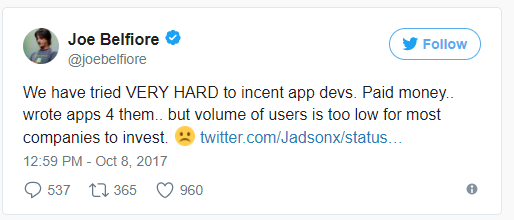Google is getting called out for their acquisition practices. Some politicians and journalist think the company set back AI several years by aqui-hiring key talent in the field and holding them back with their business practices.
The big security news this week is that WiFi, specifically WPA2 protocols, have a vulnerability that can be exploited. This vulnerability impacts both routers and devices. Check all of your WiFi enabled devices for updates.
IBM made news this week by stopping the profit bleeding (they didn’t make their numbers, but they beat expectations)… the street rewarded the company with an almost 9% stock value increase. No sarcasm here… it is nice to see IBM get a win after so many months of reporting bad news.
Acquisitions
- DXC to Merge US Public Sector Business With Vencore, KeyPoint; Mac Curtis to Lead Combined Firm
DXC Technology has agreed to merge its U.S. public sector business with Vencore and KeyPoint Government Solutions to establish a “top five” independent, publicly traded contractor within the government information technology services sector.
All three companies expect to complete the merger by the end of March 2018, subject to regulatory approvals and other customary closing conditions, DXC said Wednesday.
The combined company is expected to have more than 14,000 employees and generate approximately $4.3 billion in annual revenue with a focus on cybersecurity, big data analytics, systems engineering, enterprise IT and cloud engineering services.
- Infinidat raises $95m, becoming latest Israeli ‘unicorn’
Last week, Herzliya and Waltham, Massachusetts-based Infinidat announced it had closed a $95 million Series C financing round, led by Goldman Sachs Private Capital Investing with participation from existing investor TPG Growth.
The latest round brings the total raised by the company to $325 million. Infinidat is valued at $1.6 billion, making it the latest Israeli “unicorn” – a private startup with a valuation of $1 billion or more (although the company was claiming a billion-dollar valuation two years ago already).
https://www.israel21c.org/infinidat-raises-95m-becoming-latest-israeli-unicorn/
Artificial Intelligence
- Companies Leave Bean Counting to the Robots
Roberta doesn’t have a last name, a face, or arms. She is the first piece of robotic software to work in the Norwegian company’s treasury department, part of Statoil’s push toward automation, robotics and artificial intelligence, said Mr. Kjøllesdal, acting head of internal treasury.
Finance executives at companies including Nokia Corp., Royal Dutch Shell PLC and Orange SA are developing their own Robertas. Two thirds of large global companies expect to automate some or most of their finance-department tasks over the next two to three years, according to new research by The Hackett Group Inc. Hackett’s report is based on benchmark and performance studies at hundreds of large global companies.
But finance executives aren’t turning to robots just for savings. Automation can cut error rates by up to 66%, according to the Hackett report. It would also facilitate more analysis and smarter decisions by allowing employees to reduce the time spent on data collection by 24%.
https://www.wsj.com/articles/companies-leave-bean-counting-to-the-robots-1508407203
- Google pledges $1 billion to prepare workers for automation
While the initiative’s offerings are for US residents, Google has also pledged $1 billion in grants to non-profits that also aim to help people prepare for the changing nature of work in an increasingly high-tech world. The big G isn’t the only tech giant aiming to prevent massive job losses brought about by automation and technology in general. In Michigan, Facebook also pledged $25.5 million in training the state’s workers for high-tech jobs.
- Google Has Made a Mess of Robotics
None of the acquired companies have robots in use beyond the offices of Google’s now-parent company, Alphabet Inc. At least three key robotics chiefs who joined in that 2013 wave left the company in the last few months, and, because four years is the typical vesting period for Google stock options, they probably won’t be the last. At this point, Myers says, the exodus counts as a win for robotics, since many of the brightest minds in the field have essentially spent the past few years trapped in a time capsule. Ultimately, Google’s run on roboticists “held the industry back more than moving it forward,” she says. Alexa Dennett, a spokeswoman for Alphabet’s skunk works, X, says its robotics projects will likely take at least five more years to come to market because substantial technological advances take time.
https://www.bloomberg.com/news/articles/2017-10-12/google-has-made-a-mess-of-robotics

Datacenter/Desktop
- Samsung’s phone-as-desktop concept now runs Linux
Samsung’s DeX is a clever way to turn your phone into a desktop computer. However, there’s one overriding problem: you probably don’t have a good reason to use it instead of a PC. And Samsung is trying to fix that. It’s unveiling Linux on Galaxy, an app-based offering that (surprise) lets you run Linux distributions on your phone. Ostensibly, it’s aimed at developers who want to bring their work environment with them wherever they go. You could dock at a remote office knowing that your setup will be the same as usual.
https://www.engadget.com/2017/10/19/samsung-introduces-linux-on-galaxy/
Software/SaaS
- IBM is using the blockchain to speed up and simplify cross-border payments
The computing giant has teamed up with blockchain startup Stellar and payment company Kickex to launch a cross-border payment system for banks which uses the blockchain to “reduce the settlement time and lower the cost of completing global payments for businesses and consumers.”
Currently, international transactions take days, if not weeks, to be completed. Frustration with that has seen services like TransferWise rise, but, great as they are, they remain solutions for savvy consumers or small businesses rather than all.
A blockchain solution for banks addresses the root cause, and it could minimize the potential for errors thanks to the ledger-based system while also providing transparency and flexibility to banks.
https://techcrunch.com/2017/10/16/ibm-cross-border-payments-blockchain/?ncid=rss
Security
- Severe flaw in WPA2 protocol leaves Wi-Fi traffic open to eavesdropping
The proof-of-concept exploit is called KRACK, short for Key Reinstallation Attacks. The research has been a closely guarded secret for weeks ahead of a coordinated disclosure that’s scheduled for 8am Monday, East Coast time. A website disclosing the vulnerability said it affects the core WPA2 protocol itself and is effective against devices running the Android, Linux, Apple, Windows, and OpenBSD operating systems, as well as MediaTek Linksys, and other types of devices. The site warned attackers can exploit it to decrypt a wealth of sensitive data that’s normally encrypted by the nearly ubiquitous Wi-Fi encryption protocol.
The site went on to warn that visiting only HTTPS-protected Web pages wasn’t automatically a remedy for the risk.
“Although websites or apps may use HTTPS as an additional layer of protection, we warn that this extra protection can (still) be bypassed in a worrying number of situations,” the researchers explained. “For example, HTTPS was previously bypassed in non-browser software, in Apple’s iOS and OS X, in Android apps, in Android apps again, in banking apps, and even in VPN apps.”
Other
- Foxconn Deal in Wisconsin Hits Snag Over Guarantees
The Wisconsin Economic Development Corp. delayed a vote Tuesday to give final approval to a contract that would provide the Taiwanese firm with $3 billion in economic incentives.
On Wednesday, a Democratic state representative who opposed the deal told a local Wisconsin news organization the delay was over a “nuclear bomb” in the contract that wouldn’t sufficiently protect taxpayers in the case that Foxconn didn’t fulfill its promises, sparking concerns the deal could be in trouble.
WEDC CEO Mark Hogan said the delay was to ensure the deal was done right. “WEDC continues to do due diligence on a complex deal,” said WEDC CEO Mark Hogan in a statement. “We will take the time necessary to ensure taxpayers are protected and Foxconn is able to create tens of thousands of family-supporting jobs in Wisconsin.”
https://www.wsj.com/articles/foxconn-deal-in-wisconsin-hits-snag-over-guarantees-1508353362
- Apple and GE announce deep partnership
Apple and GE have committed to build a set of development tools and to develop apps together using Apple’s design sensibility and deep understanding of iOS, but the deal doesn’t stop there. Apple’s sales team will also push the GE Predix platform with its industrial customers when it makes sense, and GE has committed to standardizing on the iPhone and iPad for its 330,000 employees, while offering the Mac as a computer choice. All of this adds up to a level of cooperation we have not seen in Apple’s previous enterprise partnerships.
https://techcrunch.com/2017/10/18/apple-and-ge-announce-deep-partnership/?ncid=rss
- IBM Revenue Drops Again, But Mainframe, AI Units Beat Expectations
Revenue was down 0.4% from a year earlier to $19.15 billion, a minor slide but enough to make it the 22nd consecutive quarter of year-over-year declines.
Still, revenue from the hardware division, which rolled out new mainframe computers over the summer, marked its first gain from a year earlier since 2015.
Profit fell 4.5% to $2.73 billion. Margins narrowed over all and in most business units, though progressively less since the beginning of the year—a hopeful sign of stabilization.
https://www.wsj.com/articles/ibm-has-another-revenue-drop-during-its-transition-1508273024
IBM’s stock surge is one for the history booksThe stock IBM, +8.86% rocketed $12.99, or 8.9%, Wednesday to the highest close in nearly six months, after the information technology company reported third-quarter profit and revenue the beat Wall Street expectations.
Beating profit projections wasn’t a surprise, since IBM has now done so for 12 straight quarters, but the stock rallying after results is a relative rarity. And Morgan Stanley analyst Katy Huberty said the latest beat marks “a real inflection point,” as it came amid “low investor expectations” and helps support the belief that the gross margin trend is now rising.
http://www.marketwatch.com/story/ibms-stock-surge-is-one-for-the-history-books-2017-10-18
- Samsung vice chairman quits amid leadership ‘crisis’
Kwon has been the face of Samsung after Jay Y. Lee was arrested and eventually found guilty of bribery and embezzlement. Lee, who was sentenced to five years in prison, apparently bribed officials to ensure that the controversial merger of two Samsung-controlled companies would go smoothly in spite of shareholders’ disapproval. While he was only a vice chairman when he was arrested, Lee was considered the company’s de facto leader after his father, Samsung Chairman Lee Kun-hee, suffered a heart attack in 2014. The younger Lee is responsible for conjuring up the company’s long-term strategic vision.
Samsung had a great quarter, thanks mainly to the increasing demand for memory chips with large storage capacities. The mobile division’s performance also got a boost from Galaxy Note 8’s sales, but we won’t know by how much until the full earnings come out. If the conglomerate wants to top Q3’s profit, though, it has to find a way to solve the “unprecedented crisis” it’s going through.
https://www.engadget.com/2017/10/13/samsung-vice-chairman-quits-earnings-guidance-q3-2017/
Photo: rawpixel.com









